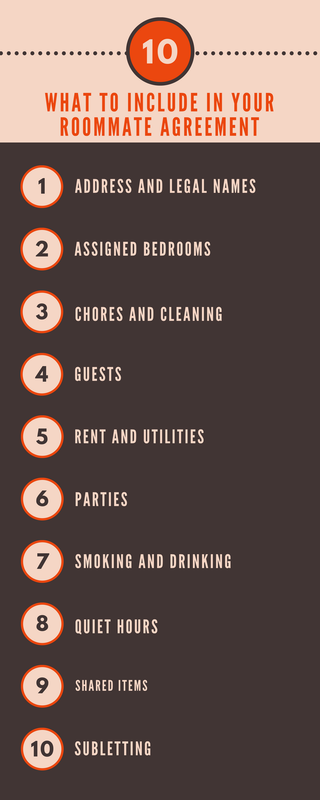A Guide to Writing a Roommate Agreement
While in college, you will most likely live with roommates. It cuts down on the cost of rent and allows you to learn together how to live independently. Living with a roommate can be a wonderful or a horrific experience. To avoid having a bad roommate experience, it’s a good idea to write a roommate agreement.
A roommate agreement will hold both you and your roommates responsible for obeying rules that have been set for your home. In this article, we will teach you how to write a comprehensive roommate agreement to ensure that you and your roommate live in harmony and are held accountable for your actions and responsibilities.
What Is a Roommate Agreement?
A roommate agreement is a written document signed by all roommates and states rules and expectations of the roommates during their time living together. It can list rules about how utilities are divided, sharing food, guests allowed in the apartment, and much more.
It’s important to have a roommate agreement so both you and your roommate know what is expected of you while living together. If you feel that your roommate is not living up to expectations, you can refer back to the roommate agreement.
Why Do You Need a Roommate Agreement?
If you are living with one of your best friends, you may think that you don’t need a roommate agreement. It’s always a good idea to write one, no matter who your roommate is. When roommates have a written agreement, they are more likely to follow the rules you both have set.
Not only will it keep harmony in your home, but it can also protect you financially. A roommate agreement can be considered a legal document. For instance, if your roommate skips out on the rent and your landlord comes to your for the money to make up for it, you can provide your roommate agreement in court showing them that you are not responsible for your roommate’s rent.
What Should Be Included in a Roommate Agreement?
You can put just about anything in a roommate agreement, as long as you and roommate agree to it. That being said, you may feel a little overwhelmed by the idea of writing a roommate agreement. There are plenty of places online to get sample agreements or make a template.
We’ve also come up with a list of important topics to talk to your roommate about while writing your roommate agreement.
Address of the Property
Make sure to include the address of where you and your roommate live. This will be important if you do end up using it in court.
Name of Parties
At the beginning of the agreement, you should have all of the legal names of your roommates. An example of how you would put this is “John Smith and John Doe agree to the terms stated in this agreement.” This is another important aspect when if it comes to using it in small claims court.
It’s also important to remember that this is an agreement between you and your roommate, not you, your roommate, and your landlord. Your agreement with the landlord would be your lease.
Assigned Bedrooms
If you are lucky, you will probably have your own bedroom in the apartment. You should state which bedrooms belong to whom in your roommate agreement. These should be considered private areas where only the assigned person can enter unless others have permission.
Cleaning and Chores
Nobody likes to live in a dirty house, but it takes some work to keep it clean. This may be the number problem between roommates. Nobody likes to clean, but it’s something that has to be done. Rather than being passive aggressive or getting annoyed with your roommate, define certain chores and what “clean” means to you in your roommate agreement.
This can take a couple of different forms. You can simply list the chores that must be done and leave it up to whoever can do it that week to complete certain chores. You can also include a schedule where you switch off on different chores each week. It’s important to find what works best for you and your roommate.
Guests
Chances are that you and your roommate have other friends who will want to come over and maybe even spend the night if they’re from out of town. One thing to consider is how many guests are allowed in your house at once? If it is a small apartment, you may only feel comfortable with a few people being there at once.
Should your roommate give you notice if they have a guest sleeping over? It can be startling to wake up one morning and see a stranger or someone you didn’t expect in your house. It’s a good idea to let your roommate know if you have someone spending the night as a courtesy.
What can guests have access to? If you are not home one night and your roommate has a guest staying over, are they allowed to use your bed? Where will your guests sleep? What can and can’t they use while they are at your house? These are all things to consider when writing your roommate agreement.
Rent
Typically, your lease does not define who pays what portions of the rent. It simply states the total rent due each month to the landlord. Your roommate agreement gives you a chance to specify who pays which amount each month.
It’s easiest to split the rent evenly between all of the roommates. However, there are some situations where one bedroom is much smaller than the others. This could result in someone paying less rent than their roommates who have bigger rooms. This is something you should put in your roommate agreement.
This is the part of the agreement that is useful in small claims court if your roommate doesn’t pay their share of the rent. Simply show the signed agreement in court to prove that they had agreed to pay X amount of rent each month. This will keep you off the hook for paying the difference.
Utilities
Along with paying rent each month, you will also need to pay utilities. This can include electricity, gas, cable, WiFi, and water. In your roommate agreement, you should state how these bills will be split and how often they will be paid. You should also state who would have which bill assigned to them.
If you have a roommate that never pays for their share of the utilities, you can use this portion of the agreement in small claims court to get them to pay you. Hopefully, it never comes to that, though.
Parties
Determine how you and your roommate feel about parties. Are you interested in throwing them? If so, there are a few things that you should consider. One of them is when parties are allowed. There are some people who like to party during the week, which is fine, but you have to make sure everyone in the house is on board with it.
What parts of the house can guests party in? You will most likely want your bedrooms to be off limits to party guests. Consider if there are any other parts of the house you would like to keep separate from the party.
As with having any guests over, how much notice should you give before throwing a party? Consider how much time it will take you to clean your house and put away anything you don’t want out for guests to potentially steal or break.
Smoking or Drinking
Are you okay with smoking and drinking the house? Some people are and some people aren’t. It’s important to determine boundaries when it comes to these activities with your roommate.
Quiet Hours
As you get to know your roommate, you’ll learn some of their habits. One of those habits may be staying up late into the night. If you are someone who likes to go to bed early, set designated quiet hours. This can be from 11 pm to 8 am, for example.
Food
Will you share your food between your roommates? If so, who will be responsible for going to the grocery store and buying which foods? Maybe there are only certain foods that you are open to sharing, such as coffee, condiments, and eggs.
Household Items
This goes back to keeping the house clean. How will you split the cost of household items like cleaning products? Since they are something that you all use, you may want to split the cost evenly or take turns buying things. It’s completely up to you and your roommate how you do this.
Pets
Consider if you will have or may have a pet in the apartment. Who is responsible for paying the pet deposit? Who is responsible for taking care of the pet? If the responsibilities are split between the roommates, write down who must do what and when.
Moving Out
There are many instances in college where you or your roommate may have to move out in the middle of your lease. This can be due to studying abroad or transferring to another school. In your roommate agreement, you should specify who is responsible for making up that person’s rent.
One solution is to find someone to take your roommate’s room. This is called subletting. Who is responsible for finding this person? Typically, it is the person moving out who is supposed to find their replacement. If they can’t find a replacement, the landlord usually still holds them responsible for paying the rent.
Any Other Important Factors
There may be some other factors that are important to you that we did not list in this article. If there are, add them to your roommate agreement! Everyone’s situation is different, which means there will never be a one-size-fits-all roommate agreement. Feel free to tailor sample roommate agreements to your needs.
Draft Your Roommate Agreement
It’s time to draft your roommate agreement. Schedule a time with your roommates to all sit down together and discuss what should be in your roommate agreement. It’s important that you draft your roommate agreement together because you can all talk about certain rules and expectations. This is the time to compromise and discuss how you will make living together run smoothly.
Agree and Sign
Once you have all agreed on the terms of your roommate agreement and someone has written it up in a formal agreement, it’s time to sign it. Read it over and make any changes necessary. When everything looks good, all of the roommates should sign and date the agreement.
Once the roommate agreement is signed, it has officially been put into effect. You have now agreed to the terms and will be held accountable for the rules and expectations stated.
Amendments and Changes
Throughout the year you may find that one of the rules you agreed on isn’t working out and is causing problems. Don’t be afraid to amend your roommate agreement. It may take a few rounds of trial and error before you find the perfect terms for your roommate agreement. Remember, nothing is perfect the first time around!
Write Your Roommate Agreement
Now that you have an idea of what you should consider when writing your roommate agreement, it’s time to get to it! Sit down with your roommates with a list of topics such as splitting the rent and utilities, allowance of guests, parties, sharing food, and quiet hours. Make sure that you all talk about these topics and come to an agreement on them. Once you have written up a formal roommate agreement, have everyone sign and date it. Congratulations! You have now successfully written and executed a roommate agreement!

Interested in using our roommate matching formula to find the perfect college roommate for you? Create a profile & take the roommate quiz on Roomsurf! Get Started



